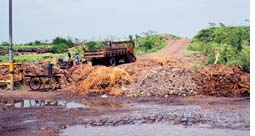Bengal wetlands treasure troves of microbes
 a landfill in the East Kolkata wetland area has emerged as a treasure trove of useful microbes that could be tapped for various biotechnological purposes.
a landfill in the East Kolkata wetland area has emerged as a treasure trove of useful microbes that could be tapped for various biotechnological purposes.
Researchers from the Dr B C Guha Centre for Genetic Engineering and Biotechnology and the department of biochemistry at the University of Calcutta, and the New Delhi-based Centre for Genomic Application stumbled upon a plethora of such bacteria in the Dhapa landfill area. They analysed the rich find to conclude that several of these bacteria could help increase soil fertility or act as eco-friendly pesticides. They also found enzymes that promise rich biotechnological returns.
"We have identified bacterial strains, which could fix nitrogen and produce extracellular enzymes like protease, cellulose, and xylanase and dissolve inorganic phosphates,' says lead researcher Dhrubajyoti Chattopadhyay.
With its microbial biodiversity, the Dhapa landfill could be tapped by industrial houses as a microbe resource utility. The findings of the study have been published in the May 20 online issue of Microbial Ecology.
Good dump The dump-yard, a haven for vegetable growers for over hundred years, is still the favourite despite being loaded with toxic wastes. After collecting soils from four different agro-ecosystems around the landfill, the team studied its microbial community as well as its biochemical nature. They identified 38 bacterial strains using a special technique called polymerase chain reaction. This helped them study a piece of common gene that codes for a specific ribosomal rna sequence (16 srrna sequence, a part of cell that aids in protein synthesis) in the bacteria.
Forty seven per cent of the isolates were found to be Bacilli (18 strains). "The isolation of Rhodococcus species was of importance since these organisms are known to be capable of degrading complex organic compounds,' Chattopadhyay points out.
Such bacteria are not common in every landfill. Some of the Bacillus strains produce insecticidal extracellular toxins and can be used as biopesticides. "We also have an isolate that was not identified either by biochemical or molecular technique and could be a novel species of bacteria. We have named it dcu-c1,' he says.
The team plans to study non-cultivable bacteria using special genomic technique. This could show the structure-function relationship of the soil area. They are also interested in producing industrially viable high quality products from isolated organisms of Dhapa using recombinant dna technology.
